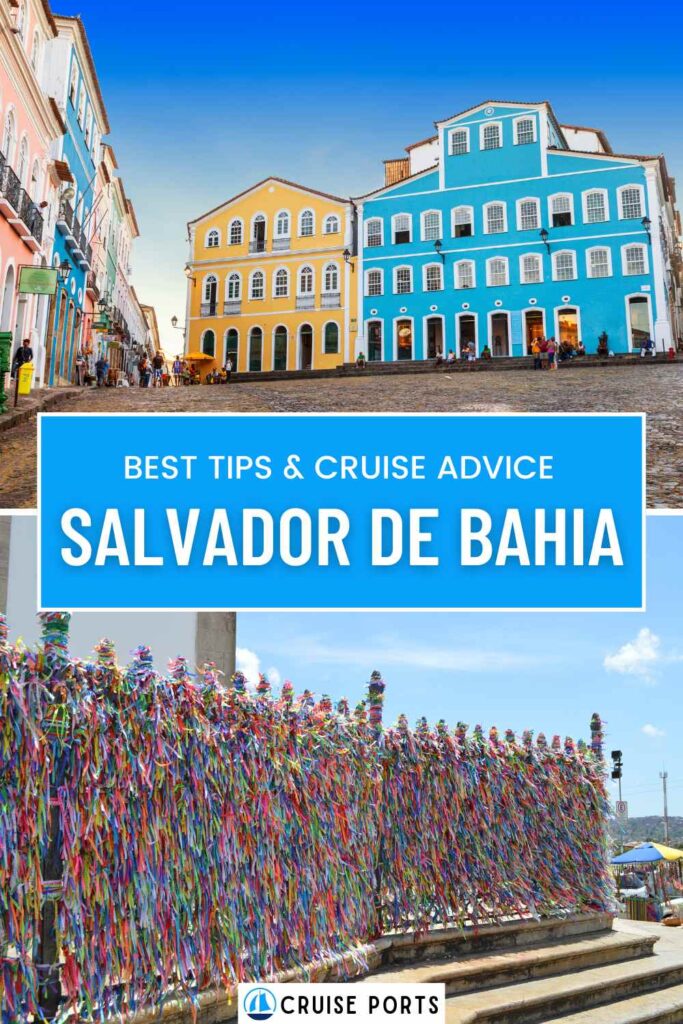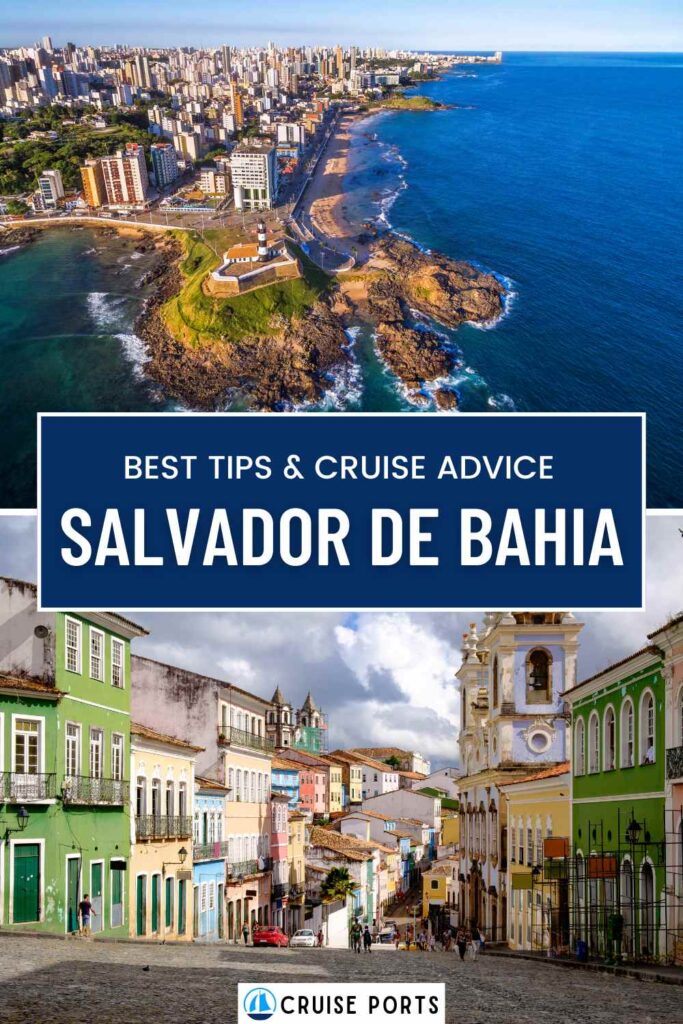Welcome to Salvador De Bahia, Brazil’s vibrant coastal gem.
This guide will help you navigate the bustling cruise port, explore the historic Pelourinho district, enjoy pristine beaches, and savor rich Bahian culture.
Discover over 40 activities and essential tips to make the most of your cruise stop in this captivating city.
Navigating the Salvador De Bahia Cruise Port
Salvador De Bahia, often simply known as Salvador, is one of Brazil’s most historically rich and culturally vibrant cities.
As the capital of the state of Bahia, Salvador is a bustling port city that has been a significant hub since the colonial era.
The Salvador De Bahia Cruise Port serves as a gateway to the city’s unique blend of Afro-Brazilian culture, colonial architecture, and stunning coastal scenery. Whether you’re a history buff, a beach lover, or a foodie, Salvador offers something for every type of traveler.
Port Facilities and Services
When you arrive at the Salvador De Bahia Cruise Port, you’ll find a well-organized terminal designed to accommodate the needs of international travelers. Here’s what you can expect:
- Layout of the Cruise Terminal: The terminal is conveniently located near the city center, with easy access to public transportation and taxis. Clear signage in multiple languages helps guide passengers through the terminal.
- Available Services:
- Wi-Fi: Free Wi-Fi is available throughout the terminal, making it easy to stay connected.
- Currency Exchange: There are currency exchange counters where you can convert your money to Brazilian Real (BRL).
- Tourist Information Centers: Friendly staff at information desks can provide maps, brochures, and advice on the best things to see and do in Salvador.
- Souvenir Shops and Cafés: Grab a quick snack or pick up a local souvenir before heading out to explore the city.
- Accessibility: The terminal is equipped with ramps, elevators, and other features to accommodate passengers with mobility challenges. Accessible restrooms and assistance services are also available.
Transportation Options
Getting from the cruise port to the heart of Salvador is straightforward, with several transportation options available:
- Public Transportation: Buses are a cost-effective way to reach various parts of the city. The bus stop is a short walk from the terminal, and buses run frequently.
- Taxis and Ride-Sharing: Taxis are readily available just outside the terminal. It’s recommended to use official taxis or ride-sharing services like Uber, which are safe and convenient. Always confirm the fare before starting your journey.
- Shuttle Services: Some cruise lines offer shuttle services directly from the port to key tourist spots, such as Pelourinho and the beaches. This can be a hassle-free option, especially if you’re short on time.
- Guided Tours: For those looking to dive deeper into Salvador’s history and culture, guided tours can be booked at the terminal. These tours often include transportation, a guide, and visits to major attractions.
Navigating the Salvador De Bahia cruise port is just the beginning of your adventure in this captivating city. Whether you choose to explore on your own or join a guided tour, Salvador promises an unforgettable experience that blends history, culture, and natural beauty.
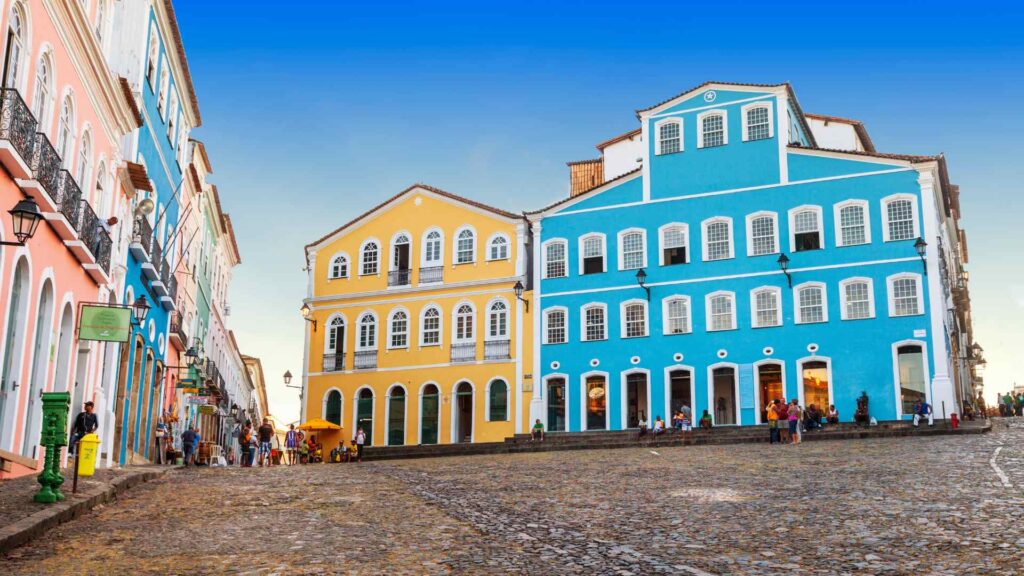
40+ Things to Do in Salvador De Bahia and Beyond
Exploring Salvador De Bahia’s Historic Center (Pelourinho)
The historic center of Salvador, known as Pelourinho, is a UNESCO World Heritage site that offers a fascinating glimpse into the city’s colonial past.
As you wander through its cobblestone streets, you’ll be surrounded by colorful colonial buildings, lively music, and the vibrant energy of Salvador.
- Key Attractions:
- São Francisco Church: One of the most ornate churches in Brazil, São Francisco is renowned for its baroque architecture and stunning gold-leafed interior.
- Elevador Lacerda: This iconic elevator connects the lower city (Cidade Baixa) with the upper city (Cidade Alta) and offers spectacular views of the harbor.
- Colonial Architecture: Take your time to admire the beautifully preserved colonial buildings that line the streets of Pelourinho. Many of these buildings now house museums, galleries, and shops.
- Cultural Experiences:
- Live Music and Dance: Pelourinho is the heart of Salvador’s cultural scene. You can catch live performances of samba, forró, and capoeira throughout the day and night.
- Local Artisans: Explore the local art scene by visiting galleries and workshops where artisans create unique pieces inspired by Afro-Brazilian culture.
Cultural Experiences in Salvador
Salvador is the epicenter of Afro-Brazilian culture, making it a unique destination for cultural immersion. Here are some must-do activities to connect with the city’s rich heritage:
- Afro-Brazilian Culture:
- Mercado Modelo: This bustling market is the perfect place to shop for traditional crafts, including handwoven baskets, colorful textiles, and intricate jewelry. It’s also a great spot to pick up souvenirs.
- Capoeira: Salvador is the birthplace of capoeira, a martial art that combines dance, acrobatics, and music. You can watch a capoeira performance or even take a beginner’s class to try it yourself.
- Candomblé: Experience Salvador’s spiritual side by visiting a Candomblé house, where you can learn about this Afro-Brazilian religion and its rituals.
Beaches Near Salvador De Bahia
Salvador’s coastline is dotted with stunning beaches, each offering a different vibe and experience. Whether you’re looking for a lively beach scene or a quiet retreat, you’ll find the perfect spot to relax.
- Top Beaches:
- Porto da Barra: Located close to the city center, this beach is popular with both locals and tourists. The calm waters make it ideal for swimming, and the sunsets here are spectacular.
- Flamengo Beach: Known for its golden sands and strong waves, Flamengo Beach is a favorite among surfers. The beach is lined with kiosks serving fresh seafood and cold drinks.
- Itapuã: This picturesque beach is famous for its palm trees, clear waters, and the iconic lighthouse. It’s a great place to unwind and enjoy some local Bahian cuisine at the beachfront restaurants.
- Beach Activities:
- Sunbathing and Swimming: Salvador’s warm climate makes it perfect for a day at the beach. Porto da Barra and Itapuã are particularly good for swimming.
- Surfing and Water Sports: Head to Flamengo Beach if you’re interested in surfing. You can also find opportunities for stand-up paddleboarding and kayaking along the coast.
- Local Food: Don’t miss the chance to try acarajé, a traditional Bahian street food, from one of the beach vendors. It’s a deep-fried ball of black-eyed pea dough filled with shrimp, vatapá, and other delicious ingredients.
Day Trips from Salvador De Bahia
If you have time to venture beyond the city, several incredible day trips await you. These excursions offer a chance to explore the natural beauty and cultural richness of the Bahia region.
- Ilha de Itaparica: Just a short ferry ride from Salvador, this island is known for its tranquil beaches and charming villages. You can spend the day relaxing on the beach, exploring historic churches, or enjoying fresh seafood at a seaside restaurant.
- Praia do Forte: About an hour’s drive from Salvador, Praia do Forte is a small village famous for its beautiful beaches and the Tamar Project, a sea turtle conservation program. It’s a great destination for families and nature lovers.
- Cachoeira: Nestled in the Paraguaçu River Valley, Cachoeira is a historic town that played a key role in Brazil’s fight for independence. The town is known for its well-preserved colonial architecture and strong Afro-Brazilian cultural traditions. Don’t miss a visit to the Church of Our Lady of the Rosary and the Dannemann Cigar Factory.
Museums and Cultural Institutions
For those interested in diving deeper into Salvador’s history and culture, the city offers a wealth of museums and cultural institutions.
- Must-Visit Museums:
- Museu Afro-Brasileiro: This museum provides a comprehensive overview of the African influence on Brazilian culture, from religion to art and music.
- Museu de Arte da Bahia: Housing an impressive collection of Brazilian art, this museum is a must-visit for art enthusiasts.
- Casa do Rio Vermelho: The former home of famous Brazilian writer Jorge Amado, now a museum dedicated to his life and works.
- Cultural Centers and Art Galleries:
- Solar do Unhão: A historic mansion that now houses the Museum of Modern Art of Bahia. It’s also a popular spot for outdoor jazz concerts.
- Centro Cultural Solar Ferrão: A cultural center in Pelourinho that hosts rotating art exhibits and performances. It’s a great place to discover contemporary Brazilian artists.
Culinary Experiences
Bahian cuisine is a delicious blend of African, Portuguese, and indigenous influences, making it one of the most unique food cultures in Brazil.
- Traditional Bahian Cuisine:
- Acarajé: A must-try street food, acarajé is made from black-eyed peas, deep-fried, and typically filled with shrimp, vatapá (a spicy paste), and other savory ingredients.
- Moqueca: This flavorful seafood stew is made with fish, shrimp, or a combination of both, cooked in coconut milk, palm oil, and a rich blend of spices.
- Bobó de Camarão: A creamy dish made with shrimp and cassava, it’s a favorite among locals and visitors alike.
- Recommended Restaurants:
- Restaurante do SENAC: Located in Pelourinho, this restaurant offers a buffet of traditional Bahian dishes. It’s a great way to sample a variety of local flavors.
- Casa de Tereza: Known for its modern take on Bahian cuisine, this restaurant offers a fine dining experience in a cozy, art-filled space.
- Porto do Moreira: A popular spot among locals, Porto do Moreira serves up hearty Bahian meals in a casual setting. The moqueca here is a must-try.
- Cooking Classes and Food Tours:
- Bahia Gastronomy Tour: Join a guided food tour to discover the best of Salvador’s street food, markets, and hidden culinary gems.
- Cooking Class with a Local Chef: Learn how to prepare classic Bahian dishes in a hands-on cooking class. This is a fun way to bring a taste of Salvador home with you.
This section has introduced you to the rich cultural experiences and diverse activities waiting for you in Salvador De Bahia. From the historic streets of Pelourinho to the sun-kissed beaches, there’s no shortage of things to do in this vibrant city.
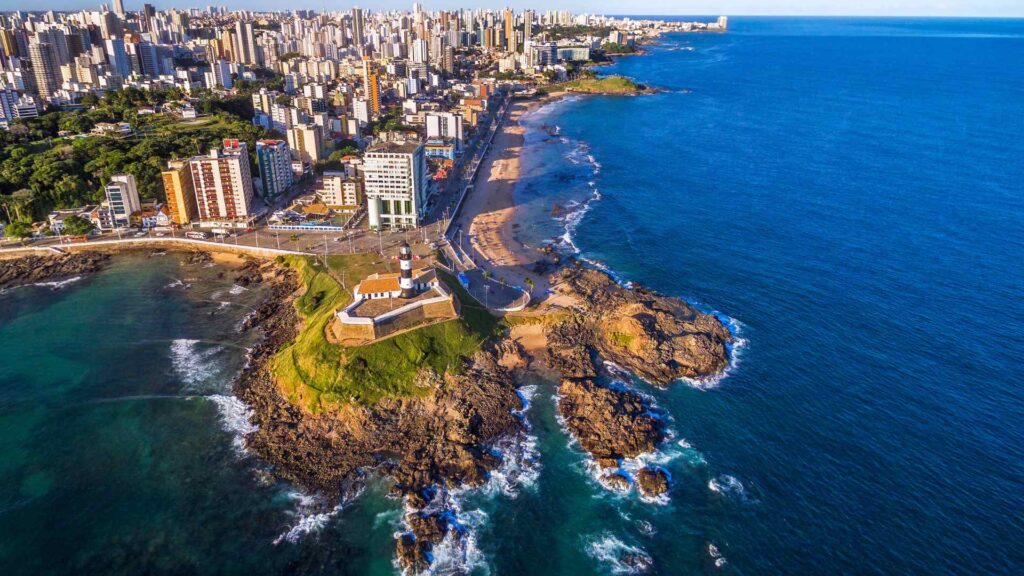
Embarking and Disembarking Tips
Arrival and Departure Procedures
When you arrive at the Salvador De Bahia Cruise Port, you’ll find that the process is generally smooth and efficient, but it’s always helpful to know what to expect to ensure a stress-free experience.
- Arrival at the Port:
- Passport Control and Customs: Upon arrival, passengers will go through passport control, where your documents will be checked. Make sure you have your passport and any necessary visas ready. After passport control, you’ll proceed through customs. Typically, this is a straightforward process, especially if you’re not carrying any restricted items.
- Health and Safety Protocols: Given recent global events, it’s wise to be prepared for any health screenings or safety protocols that might be in place. These could include temperature checks or filling out health questionnaires.
- Disembarking the Ship: The disembarkation process is usually staggered to avoid congestion. Listen for announcements on the ship regarding when your group is scheduled to leave. Have your cruise card handy as you’ll need it to exit the ship.
- Departure from the Port:
- Checking Out of the Port: When it’s time to leave Salvador De Bahia, you’ll go through customs and passport control again. Ensure you’ve left enough time to account for any queues, especially if you have a flight or another mode of transport to catch.
- Transportation Back to the Ship: If you’ve been exploring Salvador on your own, make sure to plan your return to the port carefully. Traffic can be unpredictable, especially during peak hours, so allow extra time to get back to the ship.
Luggage Handling and Storage
Managing your luggage efficiently can make your cruise experience more enjoyable, particularly when you’re exploring the city or heading out on excursions.
- Luggage Handling Services:
- Porter Services: Upon arrival, you’ll have access to porter services that can assist with your luggage. They’ll help transport your bags from the cruise terminal to your transportation or accommodation, if you’re staying in the city.
- Onboard Luggage Delivery: Most cruise lines offer luggage delivery to your cabin. Simply leave your bags with the porters when you embark, and they’ll be delivered to your stateroom.
- Luggage Storage Options:
- In-Port Storage: If you have a late flight or want to explore the city without being weighed down by your bags, some ports offer luggage storage facilities. These are usually located within or near the terminal, and they can store your bags for a few hours or the entire day.
- Hotel Storage: Many hotels in Salvador De Bahia will also store your luggage for you if you arrive before check-in time or need to leave your bags after checking out. This can be particularly convenient if you’re planning to explore the city further before heading to the airport.
- Tips for Managing Luggage:
- Pack Light: If possible, pack light, especially if you plan on taking public transportation or walking through the city. Salvador’s streets can be busy, and it’s easier to navigate with less baggage.
- Secure Your Belongings: Use locks on your luggage and keep your valuables with you at all times. While the port and city are generally safe, it’s always a good idea to be cautious, especially in crowded areas.
By following these tips, you can ensure a smooth and stress-free experience when embarking and disembarking at Salvador De Bahia Cruise Port. Whether you’re arriving in this vibrant city or preparing to depart, being prepared will help you make the most of your time in Salvador.
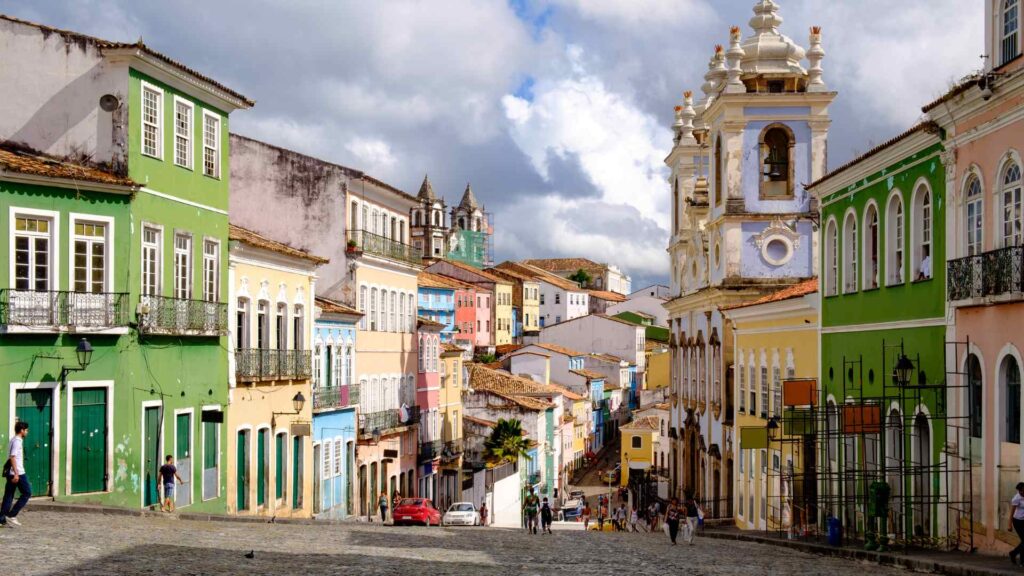
Essential Tips for Cruisers in Salvador De Bahia
Safety and Security Tips
Salvador De Bahia is a vibrant and welcoming city, but like any large urban area, it’s important to stay aware of your surroundings and take precautions to ensure a safe and enjoyable visit.
- Staying Safe in Salvador:
- Stay in Well-Populated Areas: Stick to popular tourist areas, especially in the historic center (Pelourinho), and avoid wandering off the beaten path, particularly at night.
- Be Aware of Pickpockets: Pickpocketing can occur in crowded areas. Keep your belongings secure and be especially vigilant in busy markets, public transportation, and during large events.
- Avoid Flashing Valuables: To minimize risk, avoid wearing expensive jewelry or flashing large amounts of cash. Use a money belt or crossbody bag that can be worn close to your body.
- Use Official Taxis or Ride-Sharing Services: When getting around, especially at night, it’s safer to use official taxis or reputable ride-sharing services like Uber. Always confirm the fare before starting your journey.
- Recommended Areas for Tourists:
- Pelourinho: This historic district is one of the safest areas for tourists, with a strong police presence and plenty of other visitors around. It’s the cultural heart of the city and a great place to explore during the day and evening.
- Barra: This beachfront neighborhood is another popular spot for tourists, offering beautiful views, good restaurants, and lively nightlife. It’s generally safe, but stay cautious after dark.
- Rio Vermelho: Known for its nightlife and culinary scene, Rio Vermelho is vibrant but can be a bit rowdy at night. Stick to well-lit areas and avoid wandering into unfamiliar streets.
Currency and Payments
Understanding the local currency and payment methods can make your visit smoother and help you avoid any confusion when making purchases.
- Using Brazilian Real (BRL):
- Currency Overview: The currency in Brazil is the Brazilian Real (BRL). It’s advisable to carry some cash with you for small purchases, as not all places accept credit or debit cards, especially in markets or smaller establishments.
- Exchange Rates: Keep an eye on exchange rates to ensure you’re getting a fair deal when converting your money. Currency exchange services are available at the cruise terminal, banks, and authorized exchange bureaus throughout the city.
- Where to Exchange Money:
- Currency Exchange Counters: These are available at the cruise terminal and in major tourist areas. It’s convenient but might not offer the best rates.
- ATMs: Withdrawing money from ATMs is another option. Use machines located inside banks or shopping centers for added security. Remember to notify your bank in advance to avoid any issues with your card while traveling.
- Using Credit/Debit Cards:
- Card Acceptance: Credit and debit cards are widely accepted in Salvador, especially in hotels, restaurants, and larger shops. Visa and Mastercard are the most commonly accepted, but it’s a good idea to carry some cash as a backup.
- Tipping: Tipping is not mandatory in Brazil, but it’s appreciated. In restaurants, a 10% service charge is often included in the bill. If it’s not, you can leave a tip of 10% to 15% if you’re happy with the service.
Language and Communication
Portuguese is the official language of Brazil, and while many people in tourist areas speak some English, learning a few basic Portuguese phrases can enhance your experience and help you connect with locals.
- Basic Portuguese Phrases:
- Greetings:
- “Olá” (Hello)
- “Bom dia” (Good morning)
- “Boa tarde” (Good afternoon)
- “Boa noite” (Good evening/night)
- Polite Expressions:
- “Por favor” (Please)
- “Obrigado/Obrigada” (Thank you – male/female)
- “Desculpe” (Sorry)
- “Com licença” (Excuse me)
- Useful Questions:
- “Quanto custa?” (How much does it cost?)
- “Onde fica…?” (Where is…?)
- “Você fala inglês?” (Do you speak English?)
- Greetings:
- Navigating Language Barriers:
- Use a Translation App: Having a translation app like Google Translate on your phone can be incredibly helpful. You can use it to quickly translate signs, menus, or even have basic conversations.
- Learn Key Words: Even if you don’t speak much Portuguese, knowing a few key words can go a long way. Locals appreciate the effort and are often more willing to assist if you try speaking their language.
Weather and Best Time to Visit
Salvador De Bahia enjoys a tropical climate, making it a year-round destination, but knowing the weather patterns can help you plan your trip more effectively.
- Climate Overview:
- Tropical Climate: Salvador has a tropical climate, characterized by warm temperatures and high humidity throughout the year. The average temperature ranges from 75°F to 85°F (24°C to 29°C).
- Wet and Dry Seasons: The wet season runs from April to July, with frequent, but usually brief, heavy showers. The dry season, from August to March, offers sunnier and more stable weather, making it an ideal time to visit.
- Best Times of the Year for Cruising:
- Carnival Season (February/March): Visiting during Carnival offers a unique and exciting experience, but it’s also the busiest time of year, with large crowds and higher prices. Make sure to book accommodations and excursions well in advance.
- Spring (September to November): This is a great time to visit Salvador. The weather is pleasant, the city is less crowded, and prices are more reasonable than during peak tourist seasons.
- Summer (December to February): Summer in Salvador is hot and lively, with plenty of festivals and events. It’s a popular time for tourists, so expect more crowds and higher prices.
These essential tips will help you navigate Salvador De Bahia with confidence, ensuring a safe, enjoyable, and well-prepared visit. Whether you’re exploring the city’s historic sites, relaxing on its beaches, or engaging with its rich culture, being informed will enhance your overall experience.
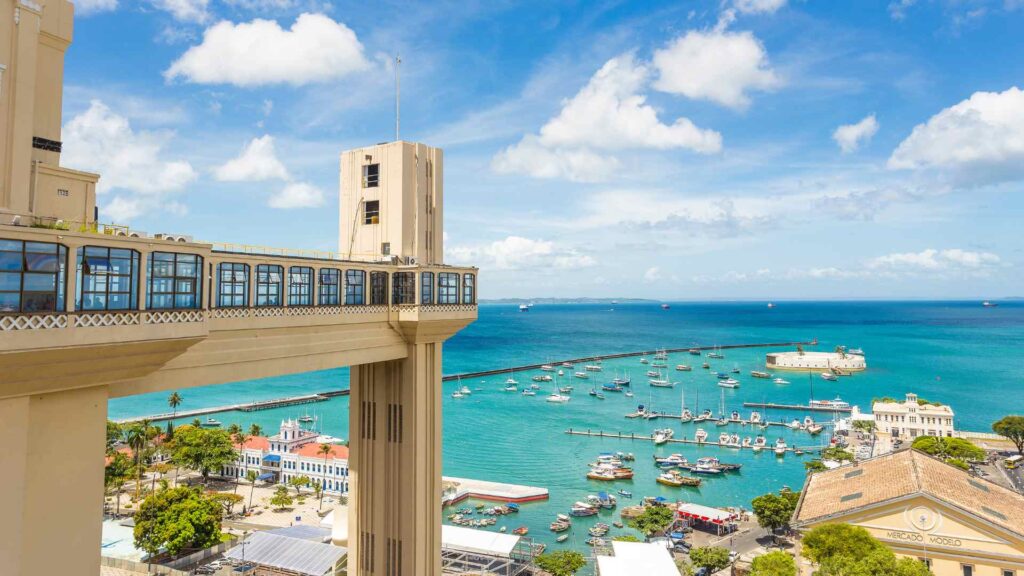
Seasonal Events and Festivals in Salvador De Bahia
Carnival in Salvador
Carnival in Salvador De Bahia is not just a festival; it’s an explosion of color, music, and joy that takes over the entire city. Known as one of the largest and most vibrant Carnivals in the world, it’s a must-experience event if your cruise coincides with this time.
- Overview of Salvador’s Carnival:
- A Unique Celebration: Unlike the more formal and choreographed Carnival in Rio de Janeiro, Salvador’s Carnival is a street party at its core. The city comes alive with blocos (street parties), where thousands of people follow massive sound trucks (trios elétricos) playing samba, axé, and other lively rhythms.
- Where to Experience Carnival: There are three main circuits where the festivities take place:
- Campo Grande: The traditional circuit, known for its parades and larger-than-life floats.
- Barra-Ondina: The most popular circuit with stunning ocean views, where the party goes on until the early hours of the morning.
- Pelourinho: The historic center offers a more cultural experience with traditional music and performances in a colonial setting.
- How to Participate: You can join the fun in several ways:
- Camarotes (VIP Areas): These are private, elevated areas along the parade routes that offer food, drinks, and a fantastic view of the festivities. They’re perfect if you prefer to enjoy the celebration with a bit more comfort and security.
- Abadás (Carnival Shirts): Purchasing an abadá grants you access to a specific bloco. This is a great way to be right in the middle of the action, dancing along with the crowds.
- Watching from the Streets: Simply enjoy the vibrant atmosphere from the sidewalks, where you can mingle with locals and other tourists.
Other Major Festivals in Salvador
Salvador is a city that loves to celebrate, and throughout the year, there are numerous festivals and events that highlight its rich cultural heritage.
- Festa de Iemanjá (February 2nd):
- Honoring the Goddess of the Sea: This Afro-Brazilian festival is dedicated to Iemanjá, the goddess of the sea. Thousands gather at Rio Vermelho beach to offer gifts and flowers, which are then taken out to sea in boats. The festival is a beautiful blend of spirituality, tradition, and community, with music, dancing, and food stalls adding to the festive atmosphere.
- Participating in the Festival: Visitors are welcome to join the celebrations. You can bring your own offerings or simply enjoy the cultural performances and processions.
- São João (June):
- Celebrating the Harvest: São João, or St. John’s Festival, is one of the most important events in Northeastern Brazil. In Salvador, the celebration includes traditional Forró music, square dancing, bonfires, and lots of regional food, like corn-based dishes and sweet treats.
- Where to Celebrate: While São João is celebrated throughout the city, the festivities are particularly lively in the outskirts, where you’ll find large gatherings, dance floors, and live music performances.
Cultural Events and Music Festivals
Salvador is not only the birthplace of many Afro-Brazilian traditions but also a city where music and dance are integral parts of life. Throughout the year, several cultural events and music festivals draw visitors from around the world.
- Bahia’s Influence on Brazilian Music:
- Afro-Bahia Festival: This annual event celebrates the influence of African culture on Bahia’s music. It features performances by some of the biggest names in Brazilian music, as well as lesser-known local artists. The festival is a vibrant display of Bahia’s rich musical heritage, with genres like samba, axé, and MPB (Popular Brazilian Music) taking center stage.
- International Jazz Festival of Bahia: Held annually, this festival brings together renowned jazz musicians from Brazil and abroad. It’s a more laid-back event, perfect for enjoying world-class music in a relaxed setting. The performances often take place in historic venues, adding to the unique atmosphere.
- Traditional Celebrations:
- Lavagem do Bonfim (January): This unique event is part religious procession, part street party. Devotees dressed in white walk from the Church of Conceição da Praia to the Church of Bonfim, where the church steps are washed in a symbolic purification ritual. The event is accompanied by music, dancing, and a lively atmosphere.
- Dia de Nossa Senhora da Conceição (December 8th): This religious festival honors Our Lady of Conceição, the patroness of Salvador. It’s one of the city’s most important religious events, with processions, masses, and celebrations taking place throughout the day.
Experiencing Salvador’s Festivals as a Cruiser
If your cruise coincides with one of Salvador’s major festivals or events, you’re in for a treat. However, it’s important to plan ahead:
- Booking Accommodations and Tours: During festival times, hotels and tours can fill up quickly, so it’s wise to book well in advance. Consider staying in a hotel closer to the festivities if you’re extending your stay in Salvador.
- Participating Safely: Festivals in Salvador are generally safe, but they can get crowded. Stick to well-lit areas, go with a group if possible, and keep an eye on your belongings. If you’re joining in on Carnival, purchasing an abadá or booking a camarote can provide an added layer of security and comfort.
Salvador De Bahia’s seasonal events and festivals offer a unique opportunity to experience the city’s vibrant culture and deep-rooted traditions. Whether you’re dancing in the streets during Carnival or enjoying the spiritual rituals of Festa de Iemanjá, these celebrations are sure to leave you with unforgettable memories.
Cruise Lines Visiting Salvador De Bahia Cruise Port
Overview of Cruise Lines and Itineraries
Salvador De Bahia is a popular port of call for many major cruise lines, offering a variety of itineraries that allow travelers to experience the vibrant culture, history, and natural beauty of this Brazilian gem. Here’s an overview of some of the cruise lines that frequently visit Salvador De Bahia:
- Major Cruise Lines:
- MSC Cruises: MSC Cruises often includes Salvador De Bahia in their South American itineraries. These cruises typically offer a mix of Brazilian ports, providing a comprehensive experience of the country’s coastal cities. Salvador is often featured as a highlight due to its rich cultural heritage and lively atmosphere.
- Costa Cruises: Costa Cruises offers itineraries that explore Brazil’s northeastern coast, with Salvador as a key stop. These cruises often focus on the region’s vibrant culture, stunning beaches, and historic sites, making Salvador a must-visit destination.
- Royal Caribbean: Known for its family-friendly amenities and diverse activities, Royal Caribbean includes Salvador in some of its South American itineraries. These cruises often combine visits to multiple Brazilian cities with stops in other South American countries, providing a well-rounded experience.
- Holland America Line: Holland America Line caters to travelers looking for a more in-depth exploration of South America. Their itineraries often include Salvador as part of longer journeys that delve into the region’s cultural and natural attractions.
- Silversea Cruises: For those seeking a luxury experience, Silversea Cruises offers itineraries that feature Salvador De Bahia. These cruises typically provide a more intimate setting, with personalized service and exclusive shore excursions.
- Boutique and Smaller Cruise Lines:
- Ponant: This French luxury cruise line includes Salvador De Bahia in some of its exotic South American itineraries. Ponant’s cruises are known for their upscale experience, smaller ships, and unique destinations.
- Azamara: Azamara focuses on destination immersion, and their itineraries often include longer stays in ports like Salvador. This allows passengers to fully explore the city, with options for overnight stays and in-depth excursions.
Typical Itineraries Featuring Salvador De Bahia
Salvador De Bahia is often featured in a variety of cruise itineraries, ranging from short regional trips to longer voyages that explore multiple countries. Here are some examples of typical itineraries that include Salvador:
- Brazilian Coast Itinerary:
- Duration: 7 to 10 days.
- Ports of Call: Rio de Janeiro, Ilhabela, Búzios, Salvador De Bahia, Recife.
- Highlights: This itinerary focuses on Brazil’s stunning coastal cities, combining the urban excitement of Rio de Janeiro with the cultural richness of Salvador and the natural beauty of Ilhabela and Búzios. It’s a great option for travelers who want to experience the diversity of Brazil’s coast.
- South America Explorer Itinerary:
- Duration: 14 to 21 days.
- Ports of Call: Buenos Aires (Argentina), Montevideo (Uruguay), Rio de Janeiro, Salvador De Bahia, Fortaleza, Manaus (Amazon River).
- Highlights: This longer itinerary offers a deep dive into South America’s most iconic destinations. From the tango rhythms of Buenos Aires to the Amazonian adventures in Manaus, with the cultural vibrancy of Salvador in between, this cruise provides a comprehensive South American experience.
- Caribbean and South America Combination Itinerary:
- Duration: 10 to 14 days.
- Ports of Call: Bridgetown (Barbados), Saint Lucia, Salvador De Bahia, Rio de Janeiro, Santos (São Paulo).
- Highlights: This itinerary combines the tropical beauty of the Caribbean with the cultural richness of Brazil. It’s ideal for travelers looking to experience both island life and the vibrant energy of South America’s coastal cities.
Cruise Packages and Deals
Finding the best cruise package to Salvador De Bahia can enhance your travel experience while providing good value for your money. Here are some tips on how to secure a great deal:
- Booking in Advance: Cruise lines often offer early booking discounts for travelers who plan ahead. If you know your travel dates well in advance, taking advantage of these discounts can save you a significant amount.
- Last-Minute Deals: If you’re flexible with your travel dates, last-minute deals can offer great value. Cruise lines sometimes reduce prices on unsold cabins as the departure date approaches, so it’s worth keeping an eye on these offers.
- Seasonal Promotions: Look out for seasonal promotions, especially during Black Friday, Cyber Monday, or during the wave season (January to March), when cruise lines typically offer attractive deals and added perks like onboard credits or free upgrades.
- Choosing the Right Cabin: Depending on your budget, consider the type of cabin that best suits your needs. Interior cabins are the most economical, while ocean view or balcony cabins offer more comfort and stunning views of Salvador’s coastline. Suites provide a more luxurious experience with additional amenities.
- Excursion Packages: Many cruise lines offer excursion packages that include tours of Salvador’s top attractions. Booking these in advance can often provide a discount compared to purchasing excursions individually once onboard.
By selecting the right cruise line and itinerary, you can tailor your journey to Salvador De Bahia to match your interests and travel style.
Whether you’re looking for a luxury experience, a family-friendly adventure, or an immersive cultural journey, there’s a cruise package that’s perfect for you. Exploring Salvador by sea offers a unique perspective on this vibrant city, making your visit truly unforgettable.
